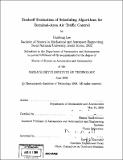| dc.contributor.advisor | Hamsa Balakrishnan. | en_US |
| dc.contributor.author | Lee, Hanbong | en_US |
| dc.contributor.other | Massachusetts Institute of Technology. Dept. of Aeronautics and Astronautics. | en_US |
| dc.date.accessioned | 2009-04-29T17:15:38Z | |
| dc.date.available | 2009-04-29T17:15:38Z | |
| dc.date.copyright | 2008 | en_US |
| dc.date.issued | 2008 | en_US |
| dc.identifier.uri | http://hdl.handle.net/1721.1/45254 | |
| dc.description | Thesis (S.M.)--Massachusetts Institute of Technology, Dept. of Aeronautics and Astronautics, 2008. | en_US |
| dc.description | Includes bibliographical references (p. 117-120). | en_US |
| dc.description.abstract | The terminal-area surrounding an airport is an important component of the air transportation system, and efficient and robust terminal-area schedules are essential for successfully meeting the projected increase in air traffic demand. Aircraft arrival schedules are subject to a variety of operational constraints, such as minimum separation requirements for safety, required arrival time-windows, limited deviation from a nominal or FCFS sequence, and precedence constraints on the arrival order. With these constraints, there is a range of desirable objectives associated with multiple stakeholders that could be optimized in these schedules. The schedules should also be robust against the uncertainty around the terminal-area. A dynamic programming algorithm for determining the minimum cost arrival schedule, given the aircraft-dependent delay costs, is presented in this thesis. The proposed approach makes it possible to determine various tradeoffs between multiple objectives in terminal-area operations. The comparison of schedules that maximize throughput to those that minimize average delay shows that the benefit from maximizing throughput could be at the expense of an increase in average delay, and that minimizing average delay is the more advantageous of the two objectives in most cases. A comprehensive analysis of the tradeoffs between throughput and fuel costs, and throughput and operating costs is conducted, accounting for both the cost of delay (as reported by the airlines) and the cost of speeding-up when possible (from models of aircraft performance). It is also demonstrated that the proposed aircraft scheduling algorithm can be applied to the optimization problem for the coupled operations of arrivals and departures on a single runway. | en_US |
| dc.description.abstract | (cont.) Using the same framework, a dynamic programming algorithm for robust scheduling in terminal-area is also developed. This algorithm is designed to minimize the possibility that an air traffic controller has to intervene the initially determined schedule under the uncertainty of the landing time accuracy due to the aircraft equipage. The result from the proposed approach is a tradeoff curve between runway throughput and robustness. | en_US |
| dc.description.statementofresponsibility | by Hanbong Lee. | en_US |
| dc.format.extent | 120 p. | en_US |
| dc.language.iso | eng | en_US |
| dc.publisher | Massachusetts Institute of Technology | en_US |
| dc.rights | M.I.T. theses are protected by
copyright. They may be viewed from this source for any purpose, but
reproduction or distribution in any format is prohibited without written
permission. See provided URL for inquiries about permission. | en_US |
| dc.rights.uri | http://dspace.mit.edu/handle/1721.1/7582 | en_US |
| dc.subject | Aeronautics and Astronautics. | en_US |
| dc.title | Tradeoff evaluation of scheduling algorithms for terminal-area air traffic control | en_US |
| dc.type | Thesis | en_US |
| dc.description.degree | S.M. | en_US |
| dc.contributor.department | Massachusetts Institute of Technology. Department of Aeronautics and Astronautics | |
| dc.identifier.oclc | 310357134 | en_US |
